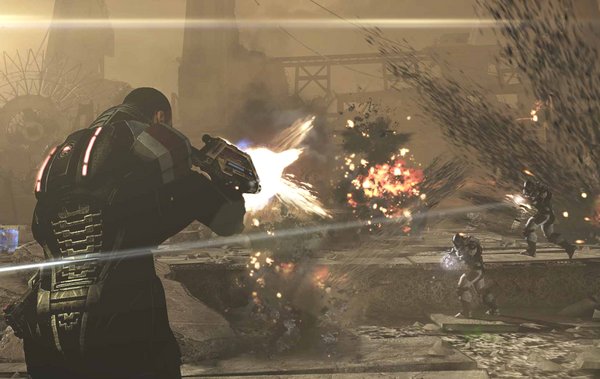With the release this week of Mass Effect 3, BioWare, the developer of this video game franchise, has delivered a compelling conclusion to a galaxy-spanning adventure that belongs in the sci-fi pantheon.
From its cinematic visual presentation; to the intimate characterizations of dozens of friends, allies and enemies; to the taut combat sequences, Mass Effect 3 draws players into a universe even George Lucas could appreciate. In fact, Mass Effect 3 is far more polished than Star Wars: The Old Republic, the multiplayer online game BioWare introduced in December.
Storytelling and immersive characterizations have long been BioWare’s trademark, and Mass Effect’s story of how you, as Commander Shepard, decide to shape the future of all sentient life is deeply personal. If you have played the previous games, hundreds of decisions you have made in the past will help determine how the story ends. As the credits rolled after about 50 hours, I found myself steeped in appreciation for how BioWare’s game developers had made so many wrinkles of the story my own.
If you have not played the earlier games, you can start from scratch, but you’ll miss much of the game’s emotional resonance. BioWare has tried to ease the transition for new players by basically boiling down the story to “man versus space robots,” but beginning the trilogy with Mass Effect 3 is akin to jumping into the “Star Wars” or “The Lord of the Rings” series at the end.
In the first game, humanity was the new kid on the galactic block, struggling for respect as a freshly spacefaring species. As Commander Shepard, you discovered that not only humanity but also all intelligent life was under threat from an insecto-mechanical enemy called the Reapers.

Similarly, perhaps, BioWare was known as a company that made thoughtful role-playing adventure games like Baldur’s Gate and Jade Empire and that was struggling for respect among run-and-gun action fans.
Narratively, the first game was a revelation: deep, mature and engaging. But mechanically, it suffered from trying to shoehorn too many role-playing conventions (like managing inventory) into a running-and-shooting style.
With the second installment, BioWare overcompensated by going to an almost purely action-based style. That made Mass Effect 2 more streamlined but ultimately less tactically interesting. And narratively, the second game felt a bit like a holding pattern, a mere waystation between discovering the big, bad threat in the first game and the promised opportunity to destroy it in the third.
Fortunately, the final chapter brings all of the ingredients together into a gripping, coherent triumph. Perhaps most brilliant, Mass Effect 3 offers players three distinct modes: rather than continue to vacillate among competing concepts of game design, BioWare devoted the resources required to let players actually choose what sort of game they want to play.
So if you don’t want to get bogged down with all of those pesky conversations — you know, all that mushy, ethical handwringing about how ruthless you’re willing to be as you save humanity — play in action mode and just concentrate on pulling the trigger. But wait. If you actually enjoy exploring complex characters with varying, competing motivations but can’t hit the broad side of a dreadnaught? Play in story mode and breeze through combat.
Of course if you want it all, you can play in what is still called role-playing mode, as I did. And when it comes to actually playing a role, the Xbox 360 version of the game provides that experience more fully than just about any game I’ve played. And that is because you can just talk to it.
Most of the attention paid to Microsoft’s optional Kinect add-on for the 360 has revolved around the Kinect’s visual image-recognition: that it can quite literally see what you are doing. But it can also hear you, using advanced voice recognition. And unlike getting up and waving your arms, speaking does not require you to take your hands off a traditional game controller.
So in combat in Mass Effect 3, you can tell your companions to use their abilities by saying something like, “Liara: warp,” or “James: frag grenade.” You can switch your ammunition type by stating “warp ammo” or “cryo ammo.”
Outside of combat, when the game gives you a choice of dialogue, you can say the words aloud (and the system almost always understands). Normally when you “talk’” to a video game character, that means clicking on an option. In Mass Effect 3 on Kinect, that means actually talking. (The game, published by Electronic Arts, is also available on PlayStation 3 and on Windows, but without voice recognition.)
So you’re sitting alone in your living room pretending you’re a space captain saving the galaxy, looking at gorgeously rendered space stations, feeling emotional about the alien you’ve fallen in love with and actually speaking out loud as you discuss the finer points of interstellar politics.
Sure it’s escapism. And in Mass Effect 3, sure it’s fantastic.
By SETH SCHIESEL






